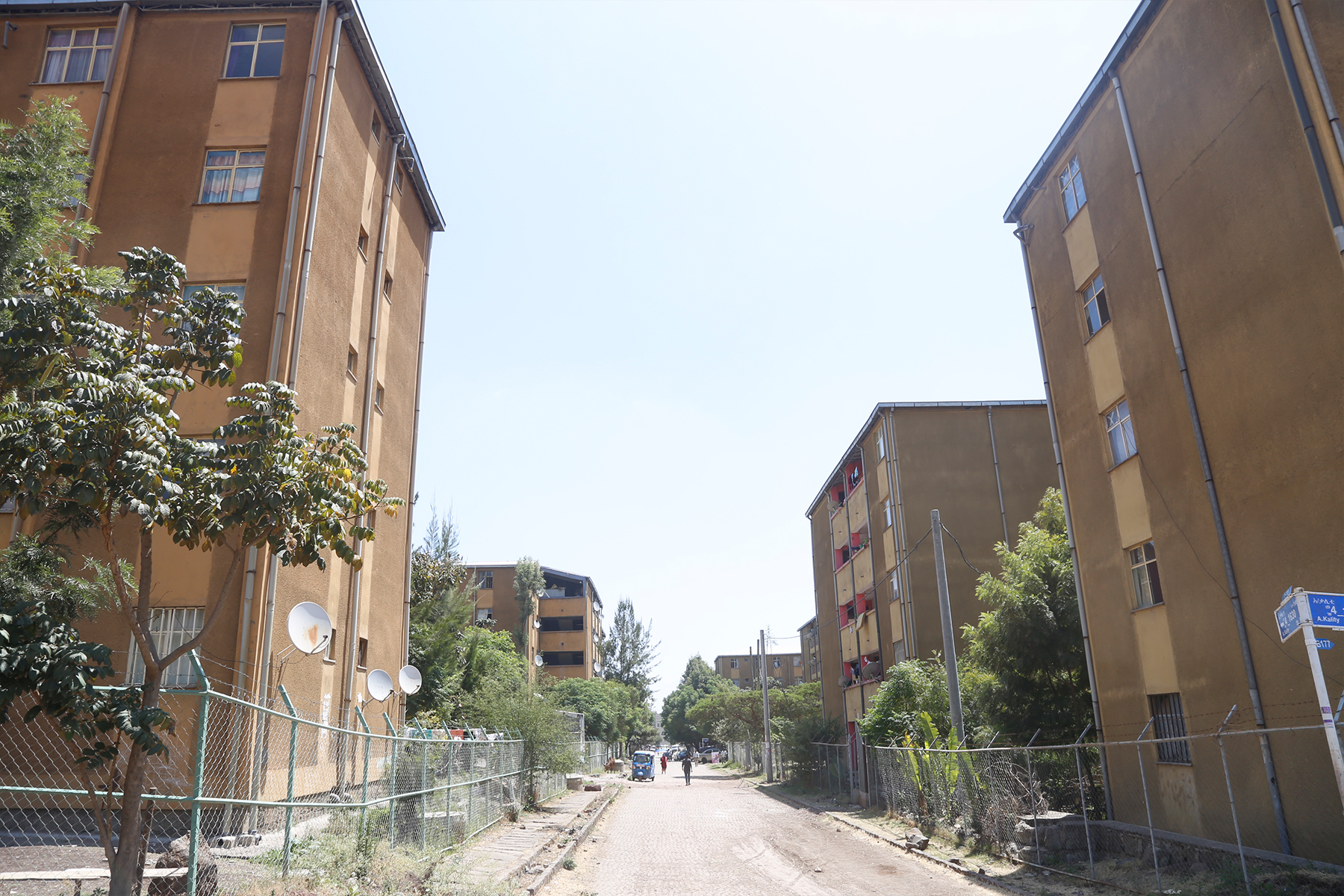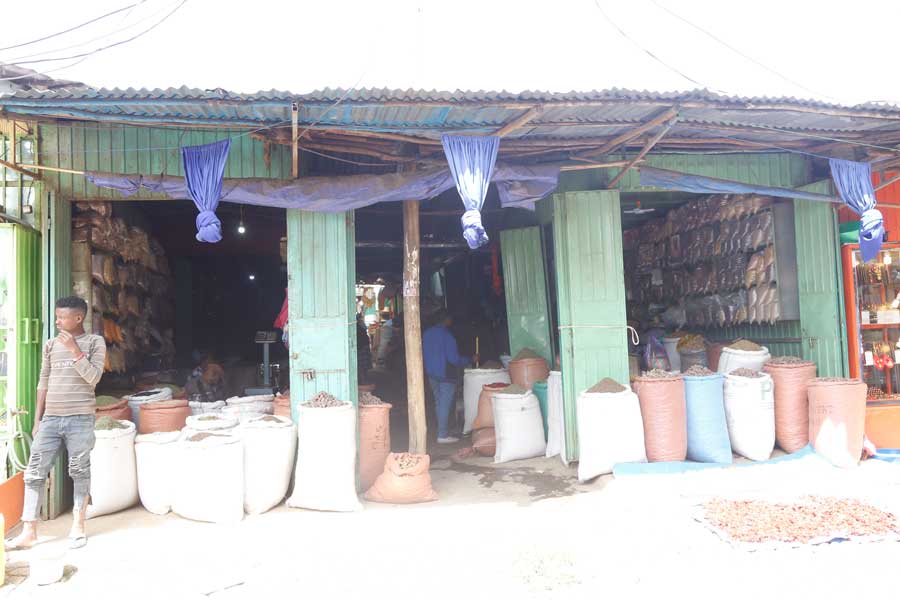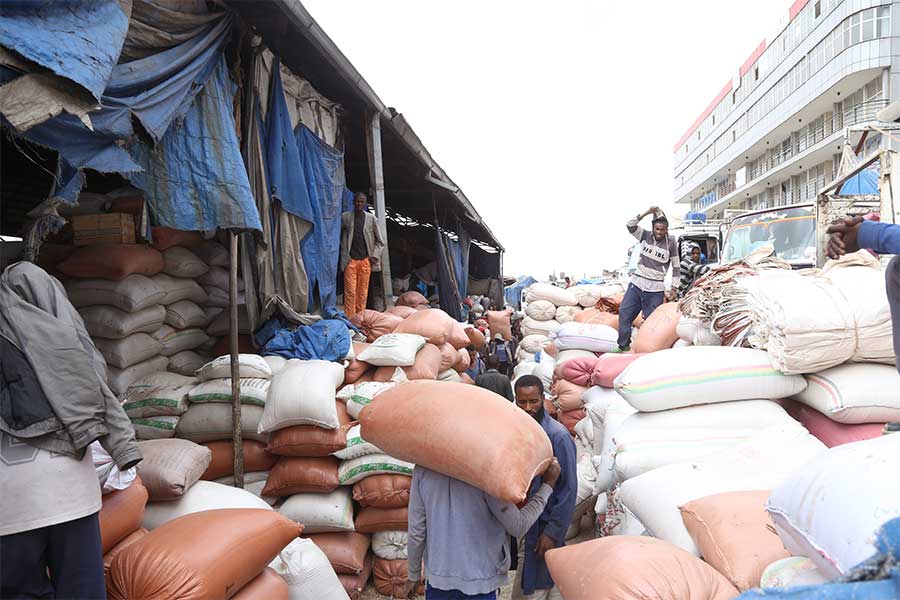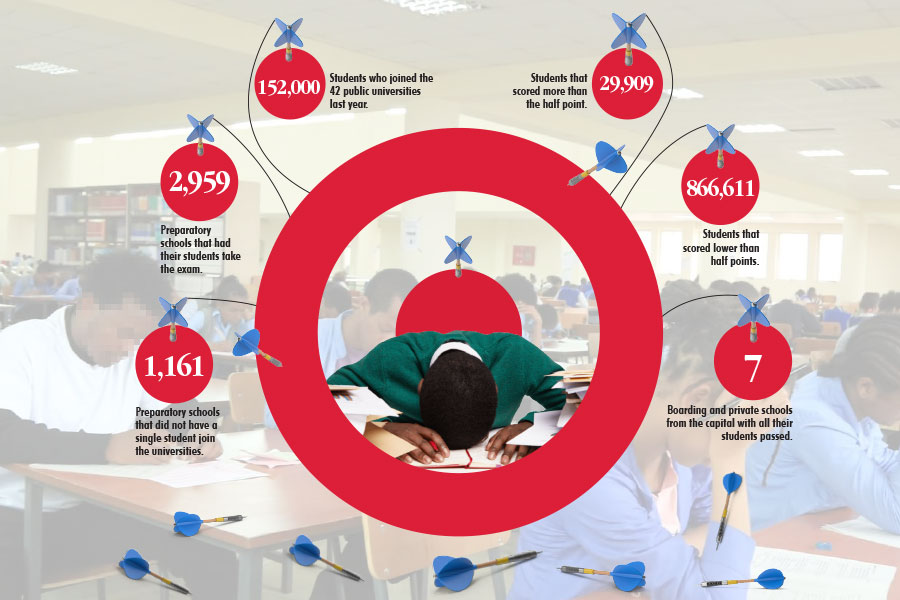
Fortune News | Apr 06,2024
The vast, green lawn inside the premises of Ghion Hotel was crammed with parents and children last week. A bazaar targeted these families with little time to run around Addis Abeba looking for school supplies for the new academic year.
Meron Gizaw and her two daughters were caught in the bustle. Wearing bright white shirts, blue sweaters, and matching skirts, the girls looked excited to be there. Their mother did not seem to share their enthusiasm. Meron is one of many parents in Addis Abeba jumping through hoops to send her children to school. She sends her daughters - a second- and fourth-grader - to a private school, preferring 4,000 Br each in monthly fees over a significantly more affordable public education.
Shopping may have been a yearly ritual for Meron and her daughters. This time, it was a little different. The mounting tuition fees have put her in a precarious position, pressured to choose between biting the bullet to keep her children in a private school or enrolling them in affordable, but crowded public schools.
The high tuition fee is not her only concern. Meron also deals with ballooning prices for school supplies, including notebooks. With a textbook price rising to 92 Br, parents feel sore about seeing their budget eaten up by the soaring cost of living.
Meron made her way to Ghion Hotel, on Ras Desta Damtew Street, from the Samit area, hoping to find school supplies at a discount. The bazaar, organised by Laro Advertising, was meant to respond to such desperate moments, comprising close to 50 vendors. Over 5,000 people visited it during the six days it remained open, disclosed Hiwot Zelalem, a representative of the event organisers.
Vendors had on offer exercise books in different sizes, designs and quality. Despite high prices, imported notebooks were in demand. Fewer than half a dozen brands, including the well-known Sinarline and Radical varieties, were on display.
Meron spent more than two hours looking for exercise books with “reasonable” prices; her daughters had other ideas in mind. They were eyeing higher quality books with a price tag of 790 Br a piece. Meron did not budge. She bought two packs of plastic-coated Sinarline brand exercise books for 1,580 Br. It is 40pc higher than what Meron paid for comparable notebooks a year ago. A packet contains a dozen books.
“I expected it to be much cheaper,” Meron told Fortune.
She had other school items on her shopping lists, such as bags and lunchboxes. School bags were going for an average of 3,500 Br each, while a single lunchbox could cost her 2,000 Br at the bazaar. They were priced beyond her means.
“I’ll try my luck elsewhere,” said Meron.
Elsewhere could be no different. Domestic demand for paper products is rising rapidly due to the expansion in education. Almost a third of the population is enrolled in various levels of education – fastened to the need for paper.
A vendor in Shola Market has a table piled high with exercise books, bags and other accessories as the academic year starts anew. A couple of weeks ago, the same market was packed with shoppers look-ing to buy items for the New Year holiday feast.
Annual demand for paper and paper products is estimated at a little more than 200,000tns. Local industries satisfy less than five percent, with imports accounting for the balance. The past three years saw 895,000tn of paper products, such as corrugated and non-corrugated paper, exercise books, and sanitary napkins, shipped for close to one billion dollars.
Close to 10 companies operate in the paper conversion industry and a single paper mill in the country. Local players have seen their market share drop over the years and are looking to regain it. These include MAMCO Paper Products Factory and Yekatit Paper Converting Plc.
Once familiar to many school-age children and parents, these companies have limited circulation in the market. Lower prices (by half) have not done much good against their imported competitors. Students, particularly younger ones, do not find their products attractive due to comparatively bargain-basement design and quality.
Founded in 1958, Yekatit converts paper into consumer-end products and packaging materials. It has an annual demand of 20,000tns of paper. It imports almost all of it from abroad. The relatively younger
MAMCO Paper Products Factory, established in 1996, produces toilet paper, facial tissues, napkins, and exercise books. Under MIDROC Ethiopia, MAMCO imports raw materials such as Jumbo paper rolls from Egypt and wood-free paper from Indonesia. Accessing forex became a daunting task for its managers. Its managers were forced to suspend production two months ago despite the dawn of the new academic year and the huge market potential it heralds.
“Our employees are on the verge of losing their jobs,” said Abdela Ahmed, administrative manager of MAMCO.
The management notified the Confederation of Ethiopian Labor Unions about MAMCO’s predicament, which has 170 employees on its payroll and recorded an annual turnover of 150 million Br four years ago. It used to produce up to eight million books annually.
Facing a raw material shortage could be chronic, but the company has had half a million books stored at a warehouse since last year, unable to find buyers.
“There is a low demand for locally-produced paper products,” Abdela told Fortune.
Asheber Tsegaye has been a wholesaler of school supplies for over a decade. He observes students favour imported books, for the ink does not seep through the pages.
He was one of the vendors at Ghion Hotel. He distributes three brands of notebooks to retail shops. His hot-ticket item is the Sinarline exercise book manufactured by Asia Pulp & Paper, an Indonesian pulp and paper company based in Jakarta. Founded in 1972, the company is among the world’s largest pulp and paper companies.
Asheber knows it is the most widely marketed brand in Ethiopia. Most of the books he sells are laminated as customers prefer them for their durability. He offered a pack of plastic-coated 50-leaf Sinarline books for 790 Br; those without the plastic cover went for 45 Br less.
Retailers in the capital sell the same pack for close to 900 Br.
Asheber blames the high prices on a supply shortage brought on by the foreign currency crunch.
Zekish Abdurahman, manager of Ethio Global Trade & Development Enterprise, another importer, shared a similar account.
“The lack of forex is the major factor behind the growing prices for school supplies,” he told Fortune.
Despite its popularity, the Sinarline is not easy to find among the many imported brands.
“You can’t buy it from importers at will,” said Asheber.
Incorporated four decades ago, Alem International Plc is among the dozen companies that import the brand. With a registered capital of 328 million Br, Alem International imports stationery and paper-based raw materials from Indonesia.
“Our import volume dropped significantly due to the foreign currency issue,” said Belay Alemneh, general manager.
New companies in the industry are finding this out as well.
Liner Paper Products Manufacturing joined the notebook market a decade ago, offering packing paper and shopping bags. The company began manufacturing exercise books last year, thus far producing 300,000. It provides a pack of 50-leaf laminated books to wholesalers at 540 Br. Non-laminated books cost 500 Br.
Despite the comparatively lower prices, the manufacturer’s management has found it challenging to penetrate the market. The ubiquitous forex shortage is a problem for Liner Paper, which operates with 25 employees, according to Biniam Yeshitela, general manager.
Experts attribute the lack of investments in the sector to substitute imported products despite the considerable potential. This is due to the business requiring huge investment capital, says Andualem Legesse, director of the office for developing the paper and packaging industry at the Chemicals & Construction Inputs Industry Development Institute.
According to a study by the International Energy Agency, a large-scale pulp mill with an annual production of 1.4 million tonnes requires 2.5 billion dollars in investment.
It took 10 years for Adal Industrial Plc, the first pulp producer, to commence production. Its factory in Gelan town can produce 3,000tns of pulp annually.
Since 1989, the company, which was incorporated with an initial capital of 10.2 million dollars, has been producing incense sticks and toothpicks from bamboo at a plant in the Sidama Regional State. Founded by Adane Berhe as a significant shareholder, Adal also manufactures bamboo flooring, curtains, table mats, and charcoal briquettes.
Two other companies are also joining the pulp production market, Andualem disclosed.
The two foreign and seven local industries producing paper products have a combined annual capacity of 110,000tns. However, they are using less than half of their installed capacity.
“The lack of working capital and shortage of foreign currency contributes to the problems,” Andualem said.
Deresse Berihun, lecturing industrial engineering at Bahir Dar University, sees undue focus by the government on export-oriented industries and not on those in import substitution as part of the issue.
“The government should provide tangible support to local manufacturers, including making sufficient credit available,” he said.
When, or if, this should come to pass is difficult to guess. Millions of parents like Meron will have to make do with unsatisfactory domestic school supplies or fork over a lot extra to send their kids to school with quality materials. The choice is often stressful to make.
PUBLISHED ON
Sep 18,2022 [ VOL
23 , NO
1168]

Fortune News | Apr 06,2024

Radar | May 26,2021

Agenda | Feb 27,2021

Life Matters | Jan 21,2023

Radar | Feb 15,2020

Agenda | Mar 14,2020

Editorial | Dec 26,2020

Fortune News | Jun 20,2020

Fortune News | Feb 04,2023

Radar | Oct 05,2024

Dec 22 , 2024 . By TIZITA SHEWAFERAW
Charged with transforming colossal state-owned enterprises into modern and competitiv...

Aug 18 , 2024 . By AKSAH ITALO
Although predictable Yonas Zerihun's job in the ride-hailing service is not immune to...

Jul 28 , 2024 . By TIZITA SHEWAFERAW
Unhabitual, perhaps too many, Samuel Gebreyohannes, 38, used to occasionally enjoy a couple of beers at breakfast. However, he recently swit...

Jul 13 , 2024 . By AKSAH ITALO
Investors who rely on tractors, trucks, and field vehicles for commuting, transporting commodities, and f...

Oct 11 , 2025
Ladislas Farago, a roving Associated Press (AP) correspondent, arrived in Ethiopia in...

Oct 4 , 2025
Eyob Tekalegn (PhD) had been in the Governor's chair for only weeks when, on Septembe...

Sep 27 , 2025
Four years into an experiment with “shock therapy” in education, the national moo...

Sep 20 , 2025
Getachew Reda's return to the national stage was always going to stir attention. Once...